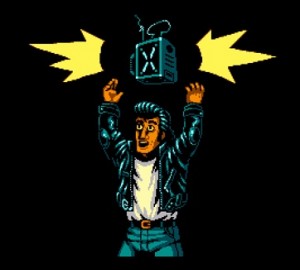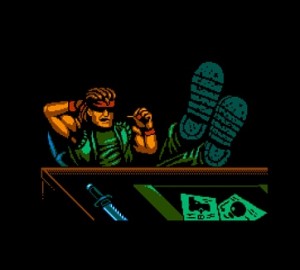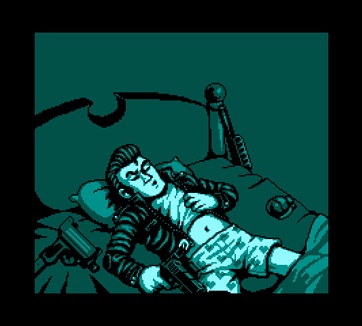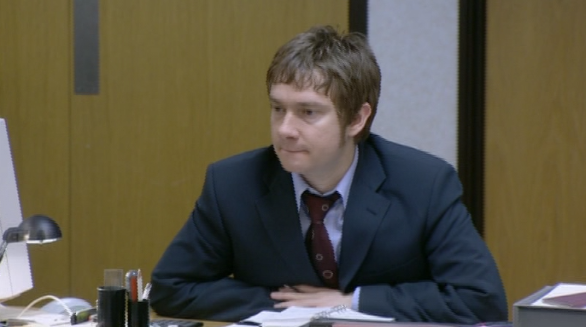The hero has arrived.
Last month, a game called Retro City Rampage was released for download on the Wii. By this point, the Wii is already dead, its place in the console market usurped by the WiiU. This was a too-late release for the system in another way as well: other versions of the game on competing systems were released in 2012. The game itself was announced in 2010…and development began all the way back in 2002. That’s an extremely long journey for anything on its way to a dead platform.
I remember the announcement well, because I decided more or less immediately that I didn’t want it. It seemed like a nice idea — retro-style games such as Mega Man 9, the Bit.Trip series and VVVVVV had a pretty high success rate as far as I was concerned, and I’d take a simplistic, difficult romp over a modern-day talky slog every time — but early screen shots, and then the eventual trailer, were enormously disappointing.
Or, rather, there was one specific thing about those screenshots and trailers that was disappointing: the sheer number of references.
 I’ve written about this before. I’m simply not a fan of references for references’ sake. I don’t like the modern tendency for the snake to wink as it swallows its tail. I want to see art that carves out its own space to inhabit…not lazily inhabit the spaces carved out by those who came before.
I’ve written about this before. I’m simply not a fan of references for references’ sake. I don’t like the modern tendency for the snake to wink as it swallows its tail. I want to see art that carves out its own space to inhabit…not lazily inhabit the spaces carved out by those who came before.
There’s a place in the world for parody — of course there is — but that place is not front and center. That place is not in the spotlight. When parody becomes the dominant form of expression you end up with garbage like Epic Movie, which ends up spoofing Nacho Libre because there simply isn’t enough straight-laced material to serve as fuel anymore, and comedy has to begin eating itself.
Personally, I’m happy to blame Family Guy for the glut of lazy references and recreations masquerading as something new. Parody has existed long before Family Guy, of course, and lazy parody has existed exactly as long. But only Family Guy seems to have found more success the lazier it gets, to the point that entire sequences and acts consist of word-for-word reenactments of other programs, films, music videos, or anything else the writers might have watched earlier that week.
It’s lazy, and it’s not creative. But people eat it up. Prior to its first cancellation, Family Guy knew how to pull off its warped style of twisted comedy. Since its revival, it’s circled ceaselessly toward a lazy singularity, replacing jokes and cleverness with joyless recreations. It’s not funny, it’s not interesting, and it even drifts into the territory of insult when they decide to lift wholesale scenes from other parodies, such as Airplane! Perhaps the Family Guy staff simply can’t tell the difference anymore. Certainly its audience can’t. And that’s beyond disappointing…that’s irresponsible.
 Retro City Rampage appeared to be following in those footsteps. One of the areas resembled the first stage of Metal Gear for the NES, complete with on-screen mocking of that game’s infamous Engrish. Two of the characters are named Bill and Lance, who we remember from Contra. A store called WonderHats uses the ThunderCats font. A dessert parlor is called Vanilla Ice Cream. Tee hee hee.
Retro City Rampage appeared to be following in those footsteps. One of the areas resembled the first stage of Metal Gear for the NES, complete with on-screen mocking of that game’s infamous Engrish. Two of the characters are named Bill and Lance, who we remember from Contra. A store called WonderHats uses the ThunderCats font. A dessert parlor is called Vanilla Ice Cream. Tee hee hee.
Even its title is a triple reference: Grand Theft Auto, River City Ransom, and Rampage. This is all before you get to the clear Back to the Future homage of its cover art. The entire thing just screamed out that it was pieced together from bits and fragments of better things.
It felt cheap. It felt lazy. It felt like it was attempting to coast on the goodwill engendered by its source material, rather than any merit that it could have possibly earned on its own. It wanted the laughter of recognition. And that’s quite possibly the least satisfying kind of laughter there is.
The game boasted a huge world to explore, but if all I was doing is finding cutesy puns on the signage and identifying bland references to better games, then it didn’t feel worth exploring. At least Family Guy delivers its own personal blend of offensive laziness to you passively…Retro City Rampage required interaction. It wasn’t enough to just groan at what you were seeing…you first would have to make the effort to track it down.
And I wasn’t interested in that.
But I learned something from Retro City Rampage. Specifically, I learned that Family Guy has done even more damage than I thought. Because not only does it train me to see references like this — even in things that I enjoy — as unnecessary and annoying, but it made me forget why people started making references like this in the first place: love.
At Nintendo Life, Featured Editor and all-around great guy Thomas Whitehead interviewed Brian Provinciano, essentially the single man responsible for the entire game. And it was a good interview, but here’s what really stood out to me:
It became public knowledge on Gamasutra in 2009 that a sales threshold is in place, whereas, if you don’t sell enough copies [as a WiiWare download], you don’t get paid a cent. […] Many developers became unable to sell enough units, and this became a reason for so many cancellations of announced WiiWare titles. The publishers knew they wouldn’t make a cent and needed to cut their losses. Between the office rent, hardware, insurance, game ratings and other costs, had I not done the WiiWare version, I could’ve saved around $20,000 – not even including my salary in porting it. And as it stands, virtually no games hit the threshold these days, so it’s only being released as fan service. A $20,000 gift to the fans.
There’s no chance — and I say this in the nicest possible way — that Retro City Rampage will hit that sales threshold. Most games released through the WiiWare service never made it, and that was definitely one of Nintendo’s major missteps with the Wii. Far from encouraging developers to put their best work into the console, it encouraged them to put it anywhere else. Releasing through WiiWare was expensive, and as more developers and games failed to turn a profit, fewer developers and games went near the service at all.
 With fewer games, the audience simply drifted away. A sales threshhold that was already near-impossible to hit just got shoved that much further out of reach.
With fewer games, the audience simply drifted away. A sales threshhold that was already near-impossible to hit just got shoved that much further out of reach.
Additionally the Wii is dead. And, with it, WiiWare. Retro City Rampage comes long after most Wii owners will have upgraded to the WiiU, and the ones that stayed behind aren’t likely to be in the habit of checking the shop channel anymore. On top of that, just about anyone who was dying for Retro City Rampage would have simply bought it somewhere else over the course of the past year.
And yet, here it is. Not because it’s expected to make any money…in fact, Provinciano is convinced it will lose him money. And I agree.
But he released it because he could. Because he made enough money from its other versions to put this one out there on a Nintendo console, as a gift to the fans. A “$20,000 gift to the fans,” to be exact.
And that’s love. That’s love, and that’s nothing short of love.
That’s also what made me buy Retro City Rampage. I know this version of the game won’t make a dime, but I bought it anyway. Because that’s the least I can do. Far from the smorgasbord of lazy references and winking visual recreations of classic games, Retro City Rampage was made with love. How do I know that? Because nothing but love could make you shovel twenty thousand dollars into a release you already know will be totally unprofitable.
It’s what I remembered about references, about why people make them, and why they took such an easy foothold in parody and pop-culture: making them betrays, or should, a love for that source material. It’s a form of flattery, a form of tipping one’s hat, respectfully, to those that laid the groundwork for what you are now able to do.
Family Guy doesn’t express love. It can’t, because it feels none. Its references are lazy at best and outright mean-spirited at worst. Robot Chicken feels very much the same way. It lives to deflate the cultural ephemera of days gone by. By contrast, when Futurama incorporates the lore of other science fiction works into its universe, it feels like the show saying thank you…no matter how they subvert the character, idea or object. Futurama exists because its creators and writers love the genre, and want to play with the same toys. Family Guy might have existed at first because Seth MacFarlane loved the golden age of television, but it continues to exist just to feed more meat into the grinder. It all comes out the same. A joyless, tasteless, inconsequential mush.
 Retro City Ransom, which I can say now that I’ve played it, is great. But I almost missed it, simply because I forgot that references aren’t always lazy…they’re often, when done right, admirable. They’re a familiar seasoning in a new and exciting dish. At least, again, when done right.
Retro City Ransom, which I can say now that I’ve played it, is great. But I almost missed it, simply because I forgot that references aren’t always lazy…they’re often, when done right, admirable. They’re a familiar seasoning in a new and exciting dish. At least, again, when done right.
Many years ago, in 1999 or so, I made two video games myself. They were both part of the same series. The first was called Larry Vales: Traffic Division, and its sequel was Larry Vales II: Dead Girls Are Easy. I haven’t thought about them in a long time, though certainly at the time I was working on them they were everything to me. I invested a lot of creative effort into two games that, for all their faults — and there were faults, boy howdy — people enjoyed. That was all I really wanted. I wanted to make people laugh, and I wanted people to have fun.
A couple of years ago I found a video on YouTube of somebody playing through the first game. I watched it, and re-experienced the game for the first time in around a decade. And I was overwhelmed by the number of references I crammed into it. Whereas Retro City Rampage mainly pays homage to classic NES games like Super Mario Bros. and Bionic Commando and Teenage Mutant Ninja Turtles, Larry Vales paid homage to The Simpsons, and 1984, and Pink Floyd. In short, it was everything that had inspired me, at some point…just as Provinciano refers back to everything that inspired him.
Watching that video, I cringed. I felt lazy. I felt as though I had every opportunity to make something interesting and unique, but I fell back on mindlessly referring to other things that I enjoyed, hoping that others would share in the nostalgia, and that would be enough. I was being a bit harsh on myself, I think now, but I also believe there’s some truth to that.
But that’s just the Family Guy effect. I felt guilty for making those references because the practice of paying gentle homage to your inspirations has been dragged through the muck and become something dirty, something lazy, and, above all else, something to be avoided.
 What I forgot — or, perhaps, was in no condition to remember — when watching that video, someone else playing through a game world of my own construction, was that I made those references out of love. They may have been lazy. They may not have been funny. But they were my way of saying thank you…of openly expressing my gratefulness for the so many wonderful things that made me want to create.
What I forgot — or, perhaps, was in no condition to remember — when watching that video, someone else playing through a game world of my own construction, was that I made those references out of love. They may have been lazy. They may not have been funny. But they were my way of saying thank you…of openly expressing my gratefulness for the so many wonderful things that made me want to create.
That’s a lesson Retro City Rampage taught me, all over again. There are a few bad apples that have poisoned the practice…but, in doing it right, it’s still as noble a way to tip your hat as it ever was.
References are a way of saying thanks. That’s something I’m going to try to remember again. Perhaps, one day, I’ll even give those thanks right back to Retro City Rampage, for showing me that someone, somewhere, still knows how to make them for the right reason, in the right way.
Hell, releasing Retro City Rampage at all, with the complete foreknowledge that it will only lose money, is a way of saying thanks. Provinciano is using Retro City Rampage as a sort of double-sided note of appreciation…he’s thanking the industry that inspired him, and the players who’ve been inspired right along with him.
It’s an admirable thing to do. And I really do hope he ends up turning a profit, against all odds, because it’s nice to see goodness rewarded in the world every now and again.
And the game is also, to put a fittingly obscene button on it, pretty fucking incredible.



